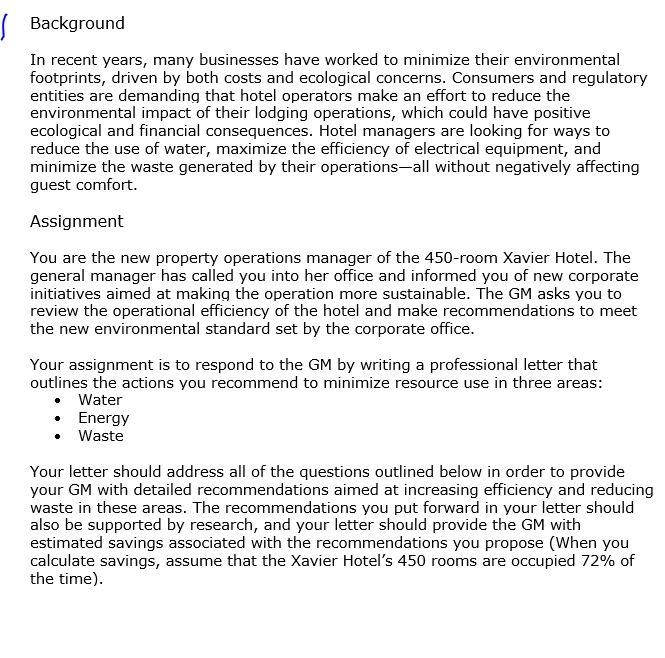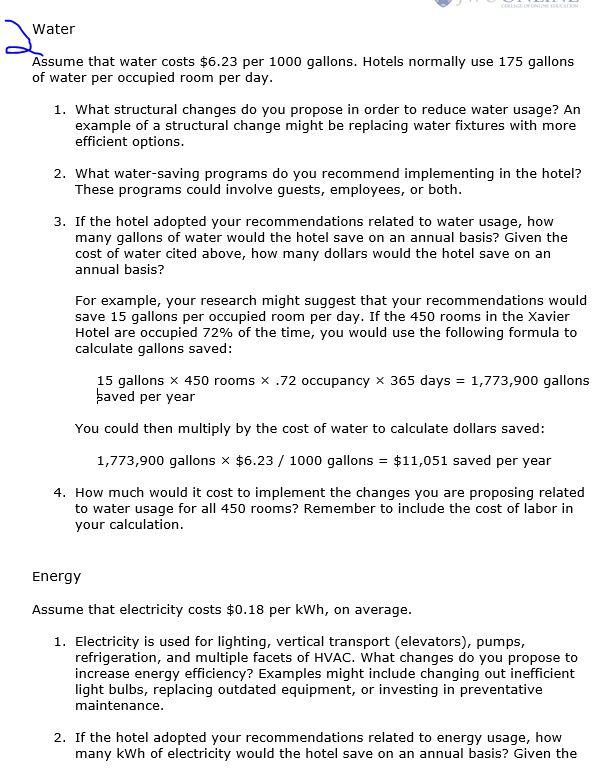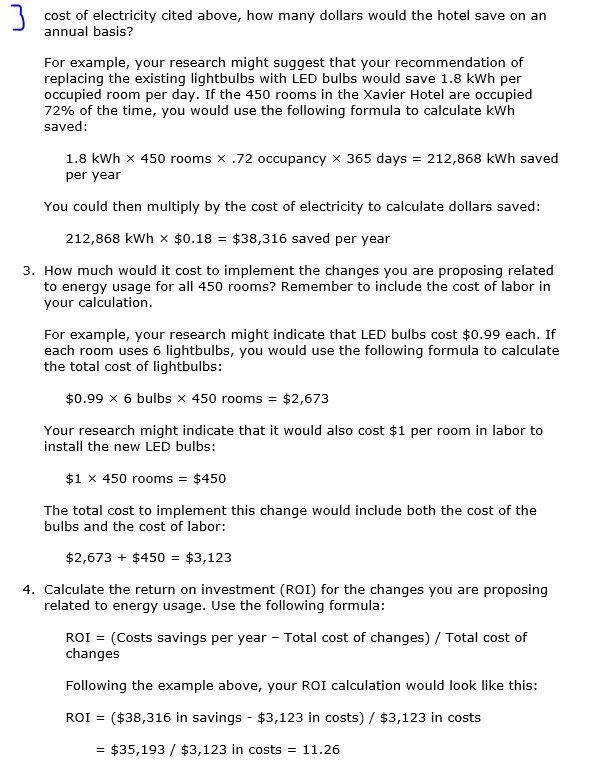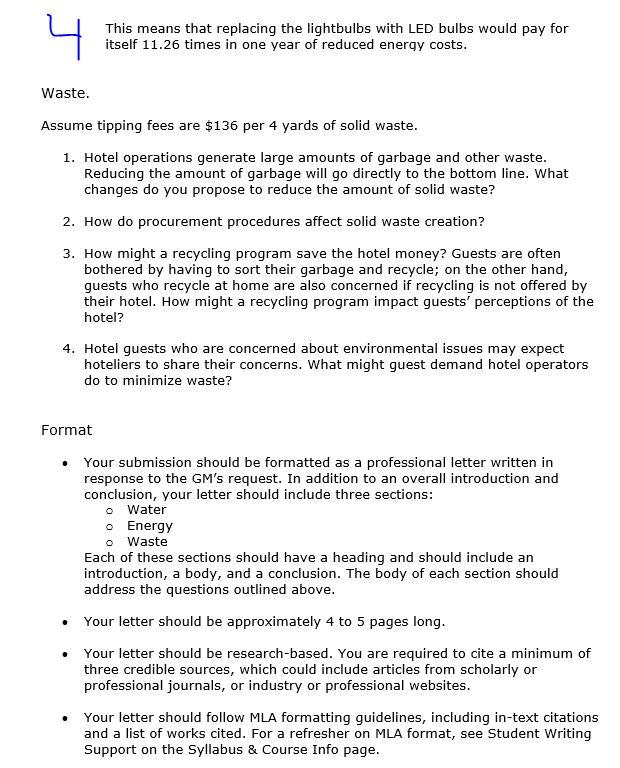



s Background In recent years, many businesses have worked to minimize their environmental footprints, driven by both costs and ecological concerns. Consumers and regulatory entities are demanding that hotel operators make an effort to reduce the environmental impact of their lodging operations, which could have positive ecological and financial consequences. Hotel managers are looking for ways to reduce the use of water, maximize the efficiency of electrical equipment, and minimize the waste generated by their operations-all without negatively affecting guest comfort. Assignment You are the new property operations manager of the 450-room Xavier Hotel. The general manager has called you into her office and informed you of new corporate initiatives aimed at making the operation more sustainable. The GM asks you to review the operational efficiency of the hotel and make recommendations to meet the new environmental standard set by the corporate office. Your assignment is to respond to the GM by writing a professional letter that outlines the actions you recommend to minimize resource use in three areas: Water Energy Waste Your letter should address all of the questions outlined below in order to provide your GM with detailed recommendations aimed at increasing efficiency and reducing waste in these areas. The recommendations you put forward in your letter should also be supported by research, and your letter should provide the GM with estimated savings associated with the recommendations you propose (When you calculate savings, assume that the Xavier Hotel's 450 rooms are occupied 72% of the time). Water Assume that water costs $6.23 per 1000 gallons. Hotels normally use 175 gallons of water per occupied room per day. 1. What structural changes do you propose in order to reduce water usage? An example of a structural change might be replacing water fixtures with more efficient options. 2. What water-saving programs do you recommend implementing in the hotel? These programs could involve guests, employees, or both. 3. If the hotel adopted your recommendations related to water usage, how many gallons of water would the hotel save on an annual basis? Given the cost of water cited above, how many dollars would the hotel save on an annual basis? For example, your research might suggest that your recommendations would save 15 gallons per occupied room per day. If the 450 rooms in the Xavier Hotel are occupied 72% of the time, you would use the following formula to calculate gallons saved: 15 gallons x 450 rooms x .72 occupancy * 365 days = 1,773,900 gallons saved per year You could then multiply by the cost of water to calculate dollars saved: 1,773,900 gallons * $6.23 / 1000 gallons = $11,051 saved per year 4. How much would it cost to implement the changes you are proposing related to water usage for all 450 rooms? Remember to include the cost of labor in your calculation. Energy Assume that electricity costs $0.18 per kWh, on average. 1. Electricity is used for lighting, vertical transport (elevators), pumps, refrigeration, and multiple facets of HVAC. What changes do you propose to increase energy efficiency? Examples might include changing out inefficient light bulbs, replacing outdated equipment, or investing in preventative maintenance. 2. If the hotel adopted your recommendations related to energy usage, how many kWh of electricity would the hotel save on an annual basis? Given the 3 cost of electricity cited above, how many dollars would the hotel save on an annual basis? For example, your research might suggest that your recommendation of replacing the existing lightbulbs with LED bulbs would save 1.8 kWh per occupied room per day. If the 450 rooms in the Xavier Hotel are occupied 72% of the time, you would use the following formula to calculate kWh saved: 1.8 kWh x 450 rooms x .72 occupancy x 365 days = 212,868 kWh saved per year You could then multiply by the cost of electricity to calculate dollars saved: 212,868 kWh x $0.18 = $38,316 saved per year 3. How much would it cost to implement the changes you are proposing related to energy usage for all 450 rooms? Remember to include the cost of labor in your calculation. For example, your research might indicate that LED bulbs cost $0.99 each. If each room uses 6 lightbulbs, you would use the following formula to calculate the total cost of lightbulbs: $0.99 x 6 bulbs x 450 rooms = $2,673 Your research might indicate that it would also cost $1 per room in labor to install the new LED bulbs: $1 X 450 rooms = $450 The total cost to implement this change would include both the cost of the bulbs and the cost of labor: $2,673 + $450 = $3,123 4. Calculate the return on investment (ROI) for the changes you are proposing related to energy usage. Use the following formula: ROI (Costs savings per year - Total cost of changes) / Total cost of changes Following the example above, your ROI calculation would look like this: ROI = ($38,316 in savings - $3,123 in costs) / $3,123 in costs = $35,193 / $3,123 in costs = 11.26 4 This means that replacing the lightbulbs with LED bulbs would pay for itself 11.26 times in one year of reduced energy costs. Waste. Assume tipping fees are $136 per 4 yards of solid waste. 1. Hotel operations generate large amounts of garbage and other waste. Reducing the amount of garbage will go directly to the bottom line. What changes do you propose to reduce the amount of solid waste? 2. How do procurement procedures affect solid waste creation? 3. How might a recycling program save the hotel money? Guests are often bothered by having to sort their garbage and recycle; on the other hand, guests who recycle at home are also concerned if recycling is not offered by their hotel. How might a recycling program impact guests' perceptions of the hotel? 4. Hotel guests who are concerned about environmental issues may expect hoteliers to share their concerns. What might guest demand hotel operators do to minimize waste? Format O Your submission should be formatted as a professional letter written in response to the GM's request. In addition to an overall introduction and conclusion, your letter should include three sections: Water o Energy Waste Each of these sections should have a heading and should include an introduction, a body, and a conclusion. The body of each section should address the questions outlined above. o . Your letter should be approximately 4 to 5 pages long. Your letter should be research-based. You are required to cite a minimum of three credible sources, which could include articles from scholarly or professional journals, or industry or professional websites. Your letter should follow MLA formatting guidelines, including in-text citations and a list of works cited. For a refresher on MLA format, see Student Writing Support on the Syllabus & Course Info page. s Background In recent years, many businesses have worked to minimize their environmental footprints, driven by both costs and ecological concerns. Consumers and regulatory entities are demanding that hotel operators make an effort to reduce the environmental impact of their lodging operations, which could have positive ecological and financial consequences. Hotel managers are looking for ways to reduce the use of water, maximize the efficiency of electrical equipment, and minimize the waste generated by their operations-all without negatively affecting guest comfort. Assignment You are the new property operations manager of the 450-room Xavier Hotel. The general manager has called you into her office and informed you of new corporate initiatives aimed at making the operation more sustainable. The GM asks you to review the operational efficiency of the hotel and make recommendations to meet the new environmental standard set by the corporate office. Your assignment is to respond to the GM by writing a professional letter that outlines the actions you recommend to minimize resource use in three areas: Water Energy Waste Your letter should address all of the questions outlined below in order to provide your GM with detailed recommendations aimed at increasing efficiency and reducing waste in these areas. The recommendations you put forward in your letter should also be supported by research, and your letter should provide the GM with estimated savings associated with the recommendations you propose (When you calculate savings, assume that the Xavier Hotel's 450 rooms are occupied 72% of the time). Water Assume that water costs $6.23 per 1000 gallons. Hotels normally use 175 gallons of water per occupied room per day. 1. What structural changes do you propose in order to reduce water usage? An example of a structural change might be replacing water fixtures with more efficient options. 2. What water-saving programs do you recommend implementing in the hotel? These programs could involve guests, employees, or both. 3. If the hotel adopted your recommendations related to water usage, how many gallons of water would the hotel save on an annual basis? Given the cost of water cited above, how many dollars would the hotel save on an annual basis? For example, your research might suggest that your recommendations would save 15 gallons per occupied room per day. If the 450 rooms in the Xavier Hotel are occupied 72% of the time, you would use the following formula to calculate gallons saved: 15 gallons x 450 rooms x .72 occupancy * 365 days = 1,773,900 gallons saved per year You could then multiply by the cost of water to calculate dollars saved: 1,773,900 gallons * $6.23 / 1000 gallons = $11,051 saved per year 4. How much would it cost to implement the changes you are proposing related to water usage for all 450 rooms? Remember to include the cost of labor in your calculation. Energy Assume that electricity costs $0.18 per kWh, on average. 1. Electricity is used for lighting, vertical transport (elevators), pumps, refrigeration, and multiple facets of HVAC. What changes do you propose to increase energy efficiency? Examples might include changing out inefficient light bulbs, replacing outdated equipment, or investing in preventative maintenance. 2. If the hotel adopted your recommendations related to energy usage, how many kWh of electricity would the hotel save on an annual basis? Given the 3 cost of electricity cited above, how many dollars would the hotel save on an annual basis? For example, your research might suggest that your recommendation of replacing the existing lightbulbs with LED bulbs would save 1.8 kWh per occupied room per day. If the 450 rooms in the Xavier Hotel are occupied 72% of the time, you would use the following formula to calculate kWh saved: 1.8 kWh x 450 rooms x .72 occupancy x 365 days = 212,868 kWh saved per year You could then multiply by the cost of electricity to calculate dollars saved: 212,868 kWh x $0.18 = $38,316 saved per year 3. How much would it cost to implement the changes you are proposing related to energy usage for all 450 rooms? Remember to include the cost of labor in your calculation. For example, your research might indicate that LED bulbs cost $0.99 each. If each room uses 6 lightbulbs, you would use the following formula to calculate the total cost of lightbulbs: $0.99 x 6 bulbs x 450 rooms = $2,673 Your research might indicate that it would also cost $1 per room in labor to install the new LED bulbs: $1 X 450 rooms = $450 The total cost to implement this change would include both the cost of the bulbs and the cost of labor: $2,673 + $450 = $3,123 4. Calculate the return on investment (ROI) for the changes you are proposing related to energy usage. Use the following formula: ROI (Costs savings per year - Total cost of changes) / Total cost of changes Following the example above, your ROI calculation would look like this: ROI = ($38,316 in savings - $3,123 in costs) / $3,123 in costs = $35,193 / $3,123 in costs = 11.26 4 This means that replacing the lightbulbs with LED bulbs would pay for itself 11.26 times in one year of reduced energy costs. Waste. Assume tipping fees are $136 per 4 yards of solid waste. 1. Hotel operations generate large amounts of garbage and other waste. Reducing the amount of garbage will go directly to the bottom line. What changes do you propose to reduce the amount of solid waste? 2. How do procurement procedures affect solid waste creation? 3. How might a recycling program save the hotel money? Guests are often bothered by having to sort their garbage and recycle; on the other hand, guests who recycle at home are also concerned if recycling is not offered by their hotel. How might a recycling program impact guests' perceptions of the hotel? 4. Hotel guests who are concerned about environmental issues may expect hoteliers to share their concerns. What might guest demand hotel operators do to minimize waste? Format O Your submission should be formatted as a professional letter written in response to the GM's request. In addition to an overall introduction and conclusion, your letter should include three sections: Water o Energy Waste Each of these sections should have a heading and should include an introduction, a body, and a conclusion. The body of each section should address the questions outlined above. o . Your letter should be approximately 4 to 5 pages long. Your letter should be research-based. You are required to cite a minimum of three credible sources, which could include articles from scholarly or professional journals, or industry or professional websites. Your letter should follow MLA formatting guidelines, including in-text citations and a list of works cited. For a refresher on MLA format, see Student Writing Support on the Syllabus & Course Info page










